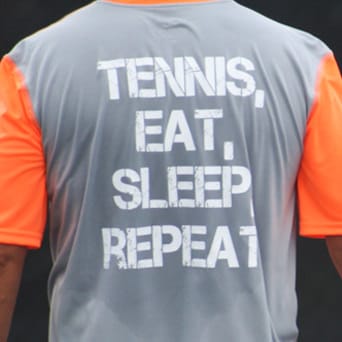February 6th, 2018
Broward Tennis Blog: 18 & Over Combo in May; Conflict Resolution
Conflict Isn’t Always in the Court, Sometimes it is on the [Tennis] Court
By Judith McKay, J.D., Ph.D., guest blogger

Photo: ATP Champions Tour
As a conflict resolution professor and practitioner, I expect to see conflict everywhere. As I often say to students and trainees, “wherever two or more are gathered, there shall be conflict.”
Therefore, I anticipate that at times and for various reasons, people will be in conflict. For me the issue is not “Will there be conflict?” but rather what will we do about the conflict?
When I think of playing tennis, I know there will be conflict at some point during the match. Most people usually see conflict as “bad,” or negative. However, conflict is inherently neither good nor bad; rather it is what we do with it that counts.
Let’s use a brand new pair of tennis shoes as an example. What happens when we wear them to play tennis without breaking them in or walking around in them before we play? We may get a blister. The blister lets us know that our new shoes are in conflict with our foot. It’s a symptom that something is wrong. By forming a blister, our foot is protecting us from further injury. Conflict can be seen as a symptom that something isn’t working. It is also provides an opportunity to fix something or to make it better.
People in relationships often have arguments and disputes. This lets them know that they need to talk, to clear up misunderstandings, and to come to new understandings. If they do not focus on being right, but focus on understanding and being understood, the conflict can actually be helpful. It can lead them to a closer, deeper relationship.
Let’s get back to tennis.
Assuming our tennis shoes fit and we don’t have a blister, why might there be conflict on the court? That is easy, just look at line calls as an example. What happens when a player disagrees with a line call? Oh my goodness! We may have every reaction from a vigorous shake of the head to someone ranting, raving, and literally hopping up and down or even throwing their racket! Why are the reactions so different and can they be improved?
The reactions are so different for a number of factors. I will focus briefly on three factors.
The first is how people were taught to understand and experience conflict. If you learned many years ago that conflict was scary, dangerous, or just awful, your reaction to conflict will tend to the negative. You may go a bit overboard thinking, “I’ll get that person before they get me!” Is conflict a competition to be won or lost?
Second, it depends on your sense of your own identity and self-confidence. Do you overreact to being “wrong?” Do you get extremely embarrassed or angry if something doesn’t go your way? Whoops, there goes that rant and your racket!
Third, your own decision-making and communication skills. Do you know how to react to conflict and how to express yourself clearly and without excess emotion? Am I able to make a quick decision about how to reasonable respond to a potentially difficult situation? Hmm, that can be a tricky one.
To recap, we respond to that line call based on many factors, but the three above boil down to:
* Our understanding and experience with conflict from our past
* Our sense of our identity — who am I? — and our level of self-confidence
* Our decision-making and communication skills
Now, is there a better way to respond instead of shouting and carrying on, like the wolf, huffing, puffing, and trying to blow someone down? We sure hope so and the answer happily is yes! There are specific skills we can learn to better handle conflict.
One is to mentally take a step back and ask yourself a scaling question. On a scale of 1-10 with 10 meaning total disaster and 1 meaning peace and calm, what number would I assign to this conflict? Is a line call ever a 10? Likely no. If you try to say it is a 9 or 10, ask yourself then what number would the end of the planet be assigned? If you can quickly see that in the arena of disasters this is not a huge disaster, then you should be able to come up with a better response. After all, a response should fit the assigned number, like the crime fitting the punishment.
Another skill is about decisions. What is my goal in this conflict? Is my goal to make my perspective known and to be better understood? Is my goal to be right at any cost? Understanding your goal will enable you to choose the best response to fit your goal. If you do not agree with the call and want to make yourself understood, speaking calmly and concisely would be a good approach. Separate the person from the problem and ask yourself, how do I best present my question, concern, or perspective? This also goes along with your sense of identity. Do you see yourself as a rational person? Rational people react very differently than those less rational. Taking a deep breath and think before you respond. It can make a big difference.
In the future, we can address more issues and examples. Enjoy the tennis courts and have fun!
Judith McKay, J.D., Ph.D., “The Conflict Coach,” is the associate professor of conflict resolution and community studies at the College of Arts, Humanities, and Social Sciences at Nova Southeastern University
Broward Combo 18 & Over Registration Open in April
By Maria Miro, USTA Florida local league coordinator

USTA NTRP levels are 6.5, 7.5, 8.5 & 9.5, and each level is a combination of NTRP ratings not exceeding .05. Start times for the league will be 9:30 or 10 a.m.
Team captains are needed, and winning local teams will advance to the USTA Florida Combo 18 & Over Sectional Championships in December.
Registration begins in April so form your teams now and mark your calendar.
For more info contact Maria Miro at miro@ustaflorida.com or (954) 609-2841, or to see other league start times in Broward County go to www.ustaflorida.com/contacts/maria-miro.


